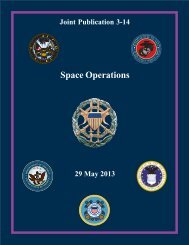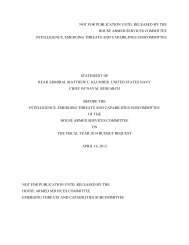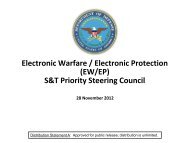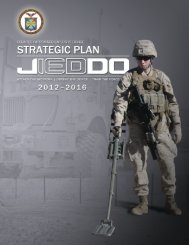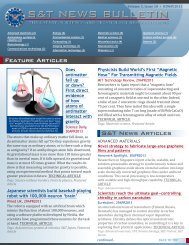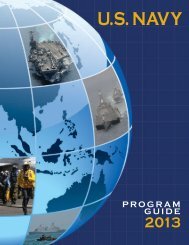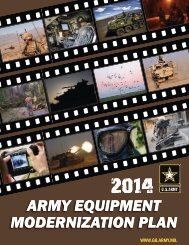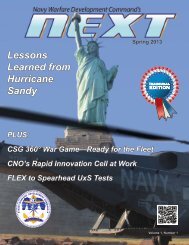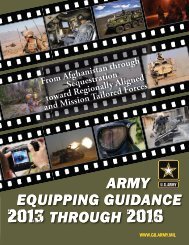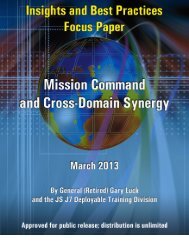JP 1, Doctrine for the Armed Forces of the United States - Defense ...
JP 1, Doctrine for the Armed Forces of the United States - Defense ...
JP 1, Doctrine for the Armed Forces of the United States - Defense ...
You also want an ePaper? Increase the reach of your titles
YUMPU automatically turns print PDFs into web optimized ePapers that Google loves.
Theory and Foundations<br />
warfare may take a variety <strong>of</strong> <strong>for</strong>ms. It may erupt among or between states or non-state<br />
entities with war-making capabilities. It may manifest as traditional warfare or IW. When<br />
<strong>the</strong> US commits military <strong>for</strong>ces into conflict, success is expected.<br />
(3) Deter Our Adversaries. Defending national interests requires being able to<br />
prevail in conflict and taking preventive measures to deter potential adversaries who could<br />
threaten <strong>the</strong> vital interests <strong>of</strong> <strong>the</strong> US or its partners. These threats could range from direct<br />
aggression to belligerent actions that none<strong>the</strong>less threaten vital national interests. Deterrence<br />
influences potential adversaries not to take threatening actions. It requires convincing those<br />
adversaries that a contemplated action will not achieve <strong>the</strong> desired result by fear <strong>of</strong> <strong>the</strong><br />
consequences. Deterrence is a state <strong>of</strong> mind brought about by <strong>the</strong> existence <strong>of</strong> a credible<br />
threat <strong>of</strong> unacceptable counteraction. Because <strong>of</strong> <strong>the</strong> gravity <strong>of</strong> potential nuclear aggression<br />
by a growing list <strong>of</strong> actors, maintaining a credible nuclear deterrent capability will remain a<br />
critical national security imperative.<br />
(4) Security Cooperation. Security cooperation encompasses all DOD<br />
interactions with <strong>for</strong>eign defense establishments to build defense relationships that promote<br />
specific US security interests, develop allied and friendly military capabilities <strong>for</strong> selfdefense<br />
and multinational operations, and provide US <strong>for</strong>ces with peacetime and contingency<br />
access to a host nation (HN). Establishing, maintaining, and enhancing security cooperation<br />
among our partner nations is important to streng<strong>the</strong>n <strong>the</strong> global security framework <strong>of</strong> <strong>the</strong> US<br />
and its partners. Security cooperation allows us to proactively take advantage <strong>of</strong><br />
opportunities and not just react to threats. Contributing to security cooperation activities is a<br />
large part <strong>of</strong> what <strong>the</strong> US military does and will continue to do. Supporting security<br />
cooperation activities is an essential element <strong>of</strong> <strong>the</strong> CCDR’s day-to-day work to enhance<br />
regional security and <strong>the</strong>reby advance national interests. Like deterrence, security<br />
cooperation activities can reduce <strong>the</strong> chances <strong>of</strong> conflict, but unlike deterrence, it does not<br />
involve <strong>the</strong> threat <strong>of</strong> <strong>for</strong>ce. Security cooperation and deterrence should be complementary as<br />
both contribute to security and prevent conflict.<br />
(5) Support to Civil Authorities. The US will continue to respond to a variety <strong>of</strong><br />
civil crises to relieve human suffering and restore civil functioning, most <strong>of</strong>ten in support <strong>of</strong><br />
civil authorities. These crises may be <strong>for</strong>eign or domestic and may occur independently, as<br />
in a natural disaster disrupting an o<strong>the</strong>rwise functioning society, or <strong>the</strong>y may occur within<br />
<strong>the</strong> context <strong>of</strong> a conflict, such as widespread suffering in a nation embroiled in an<br />
insurgency.<br />
(6) Adapt to Changing Environment. The strategic security environment and<br />
national security challenges are always changing. The ability to address <strong>the</strong> changing<br />
environment and meet our security challenges falls to <strong>the</strong> instruments <strong>of</strong> national power and<br />
<strong>the</strong> ability <strong>of</strong> <strong>the</strong> <strong>Armed</strong> <strong>Forces</strong> <strong>of</strong> <strong>the</strong> <strong>United</strong> <strong>States</strong> to conduct military operations<br />
worldwide.<br />
9. Instruments <strong>of</strong> National Power and <strong>the</strong> Range <strong>of</strong> Military Operations<br />
a. The ability <strong>of</strong> <strong>the</strong> US to advance its national interests is dependent on <strong>the</strong><br />
effectiveness <strong>of</strong> <strong>the</strong> <strong>United</strong> <strong>States</strong> Government (USG) in employing <strong>the</strong> instruments <strong>of</strong><br />
I-11



